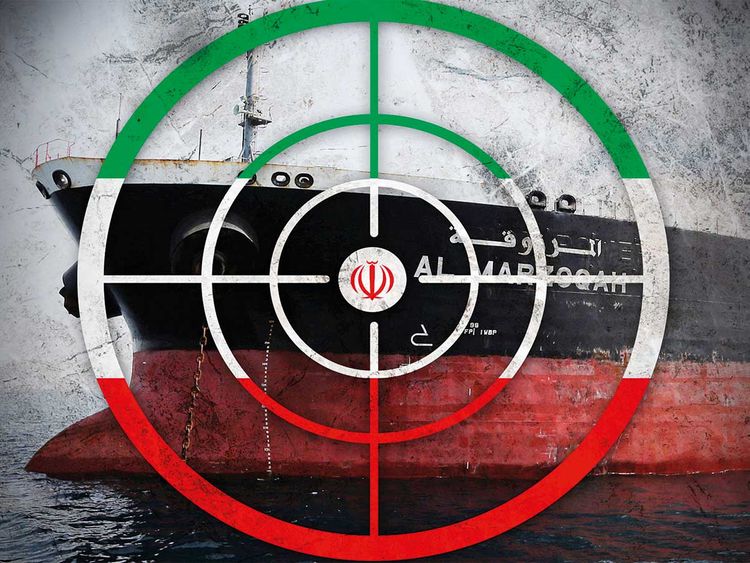
As summer approaches in the Arabian Gulf, geopolitical tensions are rising as fast as the temperature. Saudi Arabia says it has suffered drone attacks on land-based oil pumping stations, and that two of its oil tankers were sabotaged. Two other tankers, including one flagged to Nato ally Norway, were also reportedly damaged by small explosive devices. The seaborne incidents all occurred off the coast of the UAE at a maritime oil-bunkering station. Each attack ripped a five-to-ten-foot hole in the hull of the tanker near or at the waterline, suggesting the saboteurs attached mines to the ships’ sides.
In response, the United States military is exploring options to deter Iran, which is thought to be behind the tanker attacks. This has included increasing the level of operational readiness of US troops throughout the region; deploying long-range B-52 Bombers and F-15 fighters to the US base in the Gulf; sending a carrier strike group, led by the nuclear-powered Abraham Lincoln, into the waters of the Arabian Gulf; exploring options to deploy up to 120,000 new troops to the region; and issuing strong statements from the White House, promising significant military retaliation if Iran provokes an incident. All of this comes as the US further pressures the Iranian economy through harsh sanctions, which are having a significant effect.
Given the upcoming election in the US, it seems highly unlikely that President Donald Trump will want things to escalate to a full-on military confrontation. He successfully ran on the idea of pulling the US out of the region, so the odds of him approving significant military action, especially a land invasion, seem low.
The worry on which the world should focus is not a deliberate and overt Iranian attack, but a miscalculation that spirals into war. That possibility certainly has the full attention of the new US Ambassador to Saudi Arabia, retired General John Abizaid, who was previously commander of US Central Command, which includes the Middle East. Few people know better the way both cost and escalation are difficult to control in the region, and he is calling for a gathering of facts, not a military attack. “We need to do a thorough investigation to understand what happened, why it happened, and then come up with reasonable responses short of war,’ he said in Riyadh on Tuesday. “It’s not in [Iran’s] interest, it’s not in our interest, and it’s not in Saudi Arabia’s interest to have a conflict,” he added.
How could things escalate? Quite easily, unfortunately. I commanded the Carrier Strike Group Enterprise in the Gulf in the summer of 2003. Every day I watched Navy warships under my command operate with restraint as small Iranian Navy and Revolutionary Guard boats circled us, made high-speed runs in our direction, and broadcast dire warnings through propaganda. In 2016, two small US riverine patrol boats and their crews were seized by Iran. While the sailors were released shortly after, that kind of incident in today’s hair-trigger environment could easily cause the administration to launch strikes against Iranian ships. Iran could retaliate with mines against commercial shipping, threatening to close the Strait of Hormuz, through which flows 30 per cent of the world’s oil.
Pre-strike operations
This would very likely lead to the US and its allies to forcibly reopen the strait, an operation that would almost certainly require cruise missile and air strikes against the entire Iranian naval force, which would necessitate pre-strike operations against the Iranian air force. Inexorably, the forces of escalation would push both sides to employ ever-higher levels of military action.
The best approach for the US now is to return to a greater focus on allies, partners and friends. This means continuing to build an anti-Iran coalition that includes not only Saudi Arabia and the other Gulf States, but also the European and Nato partners. The role for the Europeans is to help force Iran back to the negotiating table through economic sanctions. It’s unfortunate that some of them don’t seem to be taking the increased Iranian threat seriously, even the usually reliable Brits.
The US must continue to step up its intelligence efforts in the region, especially in offensive cyber operations. Iran is a very capable cyber-opponent, and will certainly use that ability against the Saudis regionally and the US more broadly. Additional missile-defence capabilities should be deployed to the region as well.
A century ago, Europe managed to sleepwalk into a four-year war set off by an assassination in the Balkans, which led to the automatic execution of war plans and mobilisation of forces on both sides. The world can avoid stumbling into another war in the Middle East. But, as Abizaid put it, it will require using other tools “short of war”.
— Bloomberg
James Stavridis is a Bloomberg Opinion columnist. He is a retired US Navy admiral and former supreme allied commander of Nato.
https://gulfnews.com/opinion/op-eds/europe-should-help-us-turn-the-heat-on-iran-1.64025786
2019-05-18 12:40:12Z
52780298905089
Bagikan Berita Ini














0 Response to "Europe should help US turn the heat on Iran - Gulf News"
Post a Comment